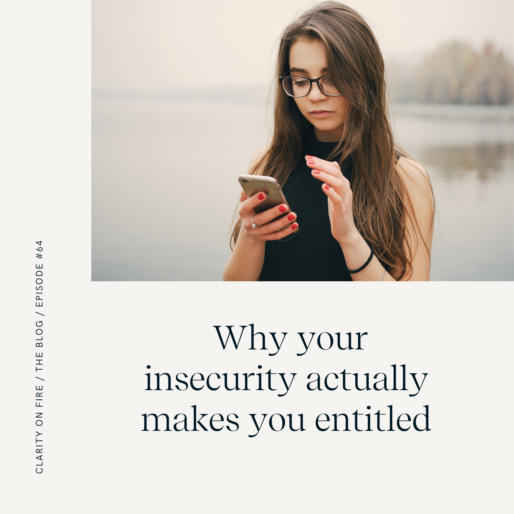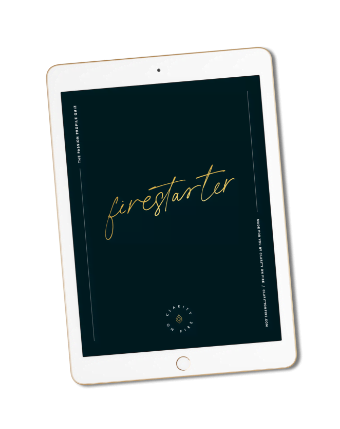Click the play button below, or subscribe and listen through our podcast on iTunes, Stitcher, or Google Play.
Podcast: Play in new window | Download
It doesn’t matter where you’re from or what generation you belong to, I know you know someone who’s actually entitled.
I’m not talking about people who are called “entitled” but don’t necessarily deserve it. (A lot of millennials and gen Z have borne the brunt of this, and it’s an unfair generalization to make about entire generations of people, considering how hardworking and engaged most of us are.)
I’m talking about the person you know who thinks they legitimately should not have to work for anything, and who is sort of dumbfounded by the very idea of struggle.
I’m talking about the person who is so deeply deluded that they constantly talk about how spectacular they are, even though they’ve done little that’s brag-worthy.
We know this person. We roll our eyes at this person. The vast majority of us are definitely not this person. But here’s the kicker — most of us are still entitled, anyway.
How does that work? How can so few of us resemble “that person,” and yet so many of us still be entitled? Well, because there are two forms of entitlement, and I only learned about one of them recently!
SPECIAL, UNIQUE LITTLE SNOWFLAKES
First, I want to roll things back for a second and come to a mutual understanding about what makes “entitlement” entitlement.
I think we can all agree that entitled people, by definition, think that they deserve something for nothing.
Whether that “something” is money, special treatment, or even happiness, someone who is genuinely entitled feels like the general rules of engagement don’t, or shouldn’t have to, apply to them.
And I think we can also agree that the reason entitled people believe they deserve something for nothing is because they possess some inherent trait or quality that renders the rules bendable, breakable, or irrelevant altogether.
In other words: “I’m extra special, so I shouldn’t be treated the same as everyone else.”
The reason this makes our blood boil is because most of us know the truth: In this life, there’s no way around hard work, struggle, failure, disappointment, and patience.
Thinking you’re somehow exempt from the human condition (which is all about polishing your character through sometimes doing grunt work, or having setbacks, or pushing yourself to the limits) is naïve and short-sighted.
No one gets to escape the human condition.
And honestly, most of us are OK with that. We may not like that fact sometimes, but the vast majority of us are willing to work hard for something that matters. We don’t need shortcuts, nor do we necessarily want them. Cutting corners often means stealing opportunities for growth from yourself. And that’s not good for any of us in the long-term.
So, yeah. Most of us don’t respond to our circumstances in an entitled way. In fact, most of us think that’s gross.
BUT THERE’S ANOTHER KIND OF ENTITLEMENT ALTOGETHER
However …
When it comes to our emotions and feelings, entitlement is EVERYWHERE.
This idea was introduced to me by Mark Manson in his book The Subtle Art of Not Giving a F*ck (seriously, I was so impressed by this book). It goes something like this:
Assuming that your feelings — particularly those of fear, shame, anger, sadness, and insecurity — are unique and special to you makes you just as entitled as someone who believes they deserve something for nothing.
I don’t know about you, but hearing that made me uncomfortable in a good way. Like, “Oh crap. I feel like he just called me out, and I KNOW he’s right.”
Pick any negative experience or emotion you’ve had lately. It could be something like …
- Getting less-than-stellar feedback about your performance and stewing over it for days.
- Feeling anxiety about what someone is going to think of you if you duck out of the office to go to the gym during lunch.
- Feeling hopeless and apathetic about finding your direction in life.
- Getting pissed off with your best friend for disrespecting your opinions.
In each of these situations, and in your situation too, everything feels very personal and unique to you.
After all, it was you who got the negative feedback. It’s you people would judge for leaving the office. It’s you who can’t figure out your direction. It’s you who’s mad at your best friend.
AND THAT’S EXACTLY THE POINT AT WHICH WE GET IT WRONG
We assume that, because our situation feels unique to us, our feelings must also be unique to us.
So, if I’m feeling all of this shame, anxiety, anger, or sadness, and if I believe that those feelings are somehow unique to me, then the next thought becomes …
“I must be more broken or messed up than the average person. I must be more flawed and less fixable. I’m different than everyone else.”
Which means that without meaning to, we end up nursing our belief in our own inadequacy in the same way an entitled person nurses their ego.
But of course, here’s the truth:
Fear, insecurity, shame, anger, resentment, blame, and sadness are all natural parts of the human condition.
It’s normal to get negative feedback sometimes. It’s understandable that your friend said something that rubbed you the wrong way. It’s OK that you feel some discomfort about ducking out of work early.
When you learn that nearly every feeling you have is not unique and specific to YOU, then you get to move on so much quicker.
WE’RE NOT GOING TO AVOID DIFFICULT FEELINGS
Like we agreed on earlier, struggle is a natural part of the human condition. It’s the elbow grease that polishes our character and makes us whole, healthy, resilient people.
You can’t avoid feeling anxiety, shame, or insecurity sometimes. That’s to be expected.
But you can avoid treating your negative experiences as if there’s something wrong with you for having them in the first place.
When you stop believing that every twinge of discomfort means that you are somehow more broken, flawed, or messed up than the next person, and you start recognizing the universality of your experiences, you get to respond very differently to life and its triggers:
“Oh, here it is again! Hello, insecurity. I see where you came from. I don’t enjoy feeling like this, but I get it. I trust it will pass.”
“Ugh, I’m angry. But that makes sense. I can’t stop feeling this way right at this very second, but I know this is only human.”
“I’m bummed that I feel so lost and unsure about life. But since I’m not all that unique, I’m guessing most everyone feels this way sometimes. Which means if they can figure it out, I can too. I’m not chronically broken.”
“I hate how hard life feels right now. But struggle is what builds the muscles I need to be happy and whole, so I’ll get through it.”
You go from seeing everything through the lens of a victim (“There’s something uniquely wrong with me, so I can’t change, heal, or move past this”) to seeing your life through a compassionate, mature, completely unentitled lens (“There’s nothing especially different about my struggles, so I know this too will pass”).
So, let’s put our heads together and agree on something one last time:
![]() In the whole history of humanity, nothing you have EVER felt is original to you.
In the whole history of humanity, nothing you have EVER felt is original to you.
There are only so many feelings and fears, after all. You didn’t invent shame, or fear, or insecurity, or anger, or sadness.
You don’t need — or deserve — to act like you’re special. Which will set you free, if you let it.
So, in what ways have you been acting (gulp) entitled about your fear, anxiety, insecurity, shame, sadness, or anger? Come share with me in the comments!
Much Love,
Rachel (& Kristen)




This is a great piece!
Such a great dose of inspiration! Keep up the great work you guys!!
Have a blessed day to you both,
Marolin.
Glad you enjoyed it, Marolin! 🙂
Truth bomb. (If that phrase is still a thing.) Needed this – thanks for calling us out. Plus, we can more easily reach out to others when we realize our feelings are universal
A truth bomb is definitely still a thing, in my book! And I agree, when you realize that all of your feelings and experiences are relatable to what the rest of humanity goes through, it makes us feel less lonely.
This is so on point! Thank you for these wise words.
You’re welcome, Katie! Thanks for reading! 🙂
This has convicted me. I feel unique and set apart from others because at 32 and single I am facing same sex attraction, not for the first time but it’s a recent attack that confuses me. It results in my entitlement because I let it isolate me as though I’m special- I’m the only one. So not true.
Thank you for sharing how this is showing up for you right now, Kyle. It’s understandable that you would be feeling confused and would be tempted to isolate yourself. But you’re right — you are SO not the only one who is feeling, or has felt, the way you feel right now.
I know it’s tempting to look outside yourself and see confirmation of your fears — that no one else is struggling with the same feelings you are; that they’re all very clear when it comes to their sexual identity. But as a coach, I’ve seen the inner workings of a LOT of people, and I’ll tell you that questioning your sexuality, even “later in life,” is way more normal than you perceive. I’m thinking of multiple examples of people I know, or know of, right now! It’s way more of a spectrum than it is a binary “this or that” type of thing. None of that necessarily makes it easier to go through what you’re going through, but it DOES help to know how normal it is for many people besides you.
This was a difficult pill to swallow. I didn’t realizeI was acting like an entitled brat. I applied your theory today at work and it quickly lessened the demons in my head.
That’s awesome, Sharon! I’m impressed that you took such quick action after reading this. I think this was a hard pill for me and a LOT of other people to swallow, so you’re in good company!
Pretty life changing post!
Thanks, Tia! If you liked this, you should definitely check out Mark Manson’s book. 🙂
This is enlightening. My husband recently called me out on my victim mentality and I didn’t get it. I struggle so much with confrontation and I have a big am right attitude…. ofcourse sometimes am not right. This piece has explained the victim mentality so clearly! Thank you ladies!!!
I’m glad this helped you see your own patterns in a new light, Monica! And kudos to you for being willing to consider your husband’s perspective without getting too defensive and resistant to change. If you haven’t listened to our episode on people pleasing, I have a feeling that one might resonate with you, too. There are aspects of that where we go into the victim mentality that might feel spot-on for you. 🙂
Well, this is a first for me: I disagree with you. I think your emotions actually are unique to you, because no one really experiences anger, sadness, grief, etc in the same way. My best friend’s mom died when we were 13. I didn’t at the time, nor do I now, understand what that feels like. I’ll never know sadness and loss like she does. Even if my mom died tomorrow, I wouldn’t know exactly how she feels. It would be my own personal experience with grief. I think it’s okay to have something that’s specific or special to you, even if it’s an emotion, and I don’t think it makes you entitled. I also have to say that I usually don’t feel better knowing someone else is going through the same thing as me. Sometimes it’s a relief, but when I’m going through something, I’m not really focused on what others around me are doing. You’re not entitled for having feelings and feeling like no one else understands, because sometimes, really, no one understands. That does happen. Sometimes we ARE broken. I think it’s okay to admit that. But no one stays the same forever- even if you feel that way, it will change eventually.
Hey Reilly! I think this is a really good example of the human paradox of both/and. And if I’d had enough space to write more, I would have gotten in to that! But you’re right–we, as humans, are both exceptionally unique (in that no one will ever have the exact same experience we’re having, in the history of the universe), and totally not unique (in that we all experience certain core emotions, and none of us are really inventing new ones) at the same time. Both/and. So yes, we’ll never exactly know how someone else experiences their feelings. It’s like biting into an apple–I know what that tastes like, but I can’t be sure that I know how an apple tastes to someone else! Even if it’s similar, there may be subtle differences. The reason I zeroed in on the “entitled” thing (which was a very intentional word choice meant to make people a little uncomfortable!) was for those of us who are leaning on our fears and using them as an excuse not to take action, or to keep ourselves down in some way. After coaching many hundreds of people, I’ve seen that pattern arise a lot–where someone thinks they’re the only one feeling like an impostor, or that they think they were the only one who felt they shouldn’t want something that they secretly wanted, etc. And when they realize that nursing those fears keeps them stuck, and that those fears aren’t actually about their own core inadequacies as people (because we ALL have those fears), then it frees them up to not listen so much to that fear. And when I say “broken,” I mean that feeling of worthlessness that people have; where they feel like there’s something deeply not enough and wrong about who they are, at their core. I don’t believe anyone is broken at their core; I believe we certainly have experiences where we *feel* broken. And hopefully this was able to illustrate for people that feeling broken is normal, but taking that to mean that you, at your core, are irrevocably flawed, is a step too far, and not necessary!